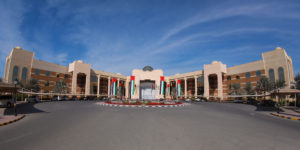Ajman University Will Provide Students Opportunities To Develop Skills And Form Friendships Through Virtual Exchange Developed With Support From The Stevens Initiative
Today, the Stevens Initiative announced its second cohort of faculty scholars and university leadership teams participating in Stevens Initiative Connected Classrooms, a program for a select group of institutions dedicated to expanding global education opportunities through virtual exchange. Ajman University will partner with faculty members at Portland StateUniversity and Green River College to plan virtual exchanges that they will implement in classrooms for the next two years.
Stevens Initiative Connected Classrooms brings virtual exchange experiences to students across Morocco, the United Arab Emirates, and the United States.It supports faculty and postsecondary institution leaders to implement, grow, and sustain these experiences by:
- Offering Faculty Capacity Building and Coaching: Connected Classrooms accompanies faculty to effectively implement virtual exchange courses using the Collaborative Online International Learning (COIL) training model.
- Providing Institutional Strategic Support and Mentoring: Through a customized approach, Connected Classrooms works closely with the institutions’ leadership to support the growth of virtual exchange at various campuses in a sustainable manner.
- Creating a Global Virtual Exchange Community: Connected Classrooms Faculty Scholars and institutional leaders collaborate, learn, and develop best practices.
In line with Ajman University’s efforts to develop globally competent graduates, and in times where confinement has limited impressionable social interactions, Ajman University is collaborating with the Stevens Initiative to benefit from their experience in the virtual exchange field. Stevens Initiative Connected Classrooms will Support AU’s internationalization efforts in three directions:
- Development of the student’s workplace skills and enrichment of their cross-cultural knowledge
- Internationalization of the curriculum
- Preparing globally competent educators
Participating in Connected Classrooms marks a significant first step into further incorporating virtual exchanges into the university experience during and post-pandemic circumstances.
“Ajman University is pleased to drive Stevens Initiative Connected Classrooms along with the Aspen Institute and other prominent global universities. It will provide students in the Middle East and the US a chance to learn from and interact with each other in a safe, virtual environment. Internationalization, diversity, and inclusion are part of our core values at Ajman University, which was the first private university in the Gulf Region to accept expatriate students. This is yet another step forward in our internationalization efforts,” said Dr. Karim Seghir, Chancellor, Ajman University.
In addition to Ajman University,the following institutions are participating in Stevens Initiative Connected Classrooms:
- Agnes Scott College
- American University in Dubai
- Goucher College
- Green River College
- Mohammed First University
- Mohammed VI Polytechnic University
- Mohammed VI University for Health Sciences
- Morgan State University
- National School of Business and Management in Dakhla, Ibn Zohr University
- Portland State University
- Sidi Mohammed Ben Abdellah University
- Sultan Moulay Slimane University
- University of New Mexico
- Zayed University
Over two years, 1,500students across all 15 institutions in Morocco, the United Arab Emirates, and the United States, including at Ajman University, will participate in a virtual exchange supported by the Initiative under Connected Classrooms.
“At the core of Connected Classrooms is a desire to forge meaningful, equitable partnerships between institutions in Morocco, the United Arab Emirates, and the United States through virtual exchange. While the Stevens Initiative provides the support and framework to make virtual exchange sustained on their campuses, these new institutions – including their faculty, administrators, and students – are collectively championing this effort. They are the true leaders and we’re humbled to partner with them,”said Christine Shiau, Managing Director, the Stevens Initiative at the Aspen Institute.
The Stevens Initiative is an international effort to build global competence and career readiness skills for young people in the United States and the Middle East and North Africa by growing and enhancing the field of virtual exchange. Created in 2015 as a lasting tribute to Ambassador J. Christopher Stevens, the Initiative is committed to helping to expand the virtual exchange field through three pillars of work: investing in promising programs, sharing knowledge and resources, and advocating for virtual exchange adoption.
Ajman University was founded in 1988 as the first private institution of higher education in the United Arab Emirates and the Gulf region, Ajman University (AU) is now being recognized as an emerging leader on the global academic map. The 2021 QS World University Rankings lists AU among the top 750 universities worldwide. The latest “Top 50 Under 50” QS Rankings names AU as one of the top 150 young universities in the world.
Ajman University’s participation in Connected Classrooms is supported by the Stevens Initiative, which is sponsored by the U.S. Department of State, with funding provided by the U.S. Government, and is administered by the Aspen Institute. The Stevens Initiative is also supported by the Bezos Family Foundation and the governments of Morocco and the United Arab Emirates.
More Information
The U.S. Department of State’s Bureau of Educational and Cultural Affairs (ECA) builds relations between the people of the United States and the people of other countries through academic, cultural, sports, professional and private exchanges, as well as public-private partnerships and mentoring programs. These exchange programs improve foreign relations and strengthen the national security of the United States, support U.S. international leadership, and provide a broad range of domestic benefits by helping break down barriers that often divide us.Visit eca.state.gov.
The Aspen Institute is a global nonprofit organization committed to realizing a free, just, and equitable society. Founded in 1949, the Institute drives change through dialogue, leadership, and action to help solve the most important challenges facing the United States and the world. Headquartered in Washington, DC, the Institute has a campus in Aspen, Colorado, and an international network of partners. For more information, visit www.aspeninstitute.org.
The Bezos Family Foundation supports rigorous, inspired learning environments for young people, from birth through high school, to put their education into action. Through investments in research, public awareness, systems building and programs, the foundation works to elevate the field of education and improve life outcomes for all children.
The Kingdom of Morocco has held a longstanding commitment to the promotion of peace, mutual understanding and respect across all fora. In line with this commitment, the Government of the Kingdom of Morocco is a strong supporter of the Stevens Initiative and is proud to be included in its programs, which foster opportunities for cross-cultural exchanges between youth.
The Embassy of the United Arab Emirates (UAE) in Washington, D.C.is committed to promoting and increasing cross-cultural understanding and educational exchanges. In line with the UAE Government’s values, the Embassy supports educational programming at schools and universities across the U.S. The Embassy works with U.S. institutions to provide unique opportunities for peer-to-peer exchanges and help broaden student’s horizons.






